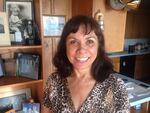
Anna Griffin / OPB
Diana Grotte has the dark eyes and light brown skin of a Pacific Islander. She also has an accent that is hard to immediately place. When people ask where she’s from, they often don’t believe her answer.
"When I tell them I'm Dutch, they'll say, ‘Oh hogwash.’ You should be having blonde hair and blue eyes. That's what they really think," she said.
Grotte is a child of western colonialism. She was born in the country now known as Indonesia. Her parents were Dutch citizens, and so when the Indonesians won their independence in the late 1940s, they were among thousands of Dutch families forced to leave for Europe.
"My parents lost basically everything. We were only allowed to have a certain amount of money. There were six of us kids, so there were eight people and two trunks. We were placed in holding areas in the Netherlands until they found places for us to live."
Eventually, they found a house in The Hague. Still, other children reminded her – regularly – that she looked more Asian than Dutch. In other words, not like them.
"They called me brown poop Chinese. In Dutch, “poepchinezen, bruine poepchinezen.” Bruine, which is brown, poep, which is poop just spelled different and chinezen, which is Chinese. They also told me I needed to go back to my own country."
In some ways, she felt more at ease – or maybe less foreign -- when she arrived in the United States in the late 1960s. One of her older sisters had come first, and Grotte moved to help her through some health problems. She didn’t expect to stay, but her sister needed her, and then she met her first husband.
"In 1983, I became a U.S. citizen, because I had children, and I felt I really should do that. But I also still consider myself Dutch. I don't think that will ever leave. People ask me, ‘Well, do you have loyalty?’ I have loyalty to both."
And yet, she’s sometimes treated like a stranger here in her adopted country and her adopted region. It’s about her appearance, not her accent.
"I have been called a wetback, a goddamn Mexican, a dirty, filthy Indian. And they always tell me I ought to go back to my own country, which they think of course is down south of the border."
She chalks the slurs she’s heard recently up to the racially charged rhetoric of Donald Trump’s presidential campaign. But this kind of talk has dogged her off and on since she moved to the United States. So she thinks there’s a broader kind of cultural ignorance or provincialism at play here.
"Maybe they don't learn enough in school. Most people say, ‘Well, what's the Netherlands?’ And, ‘Where's Holland?’ I think a lot of that has to do with education here.
"We learned, in fifth grade you get one foreign language – French — no choice. You get that. In 6th grade, they add English to that, and when you go through high school, you learn German, French and English. It’s no choice, it’s part of your education. I can still understand German, and I still understand French. I did take almost two years of Spanish here. I just thought it’d be kind of fun," she said.